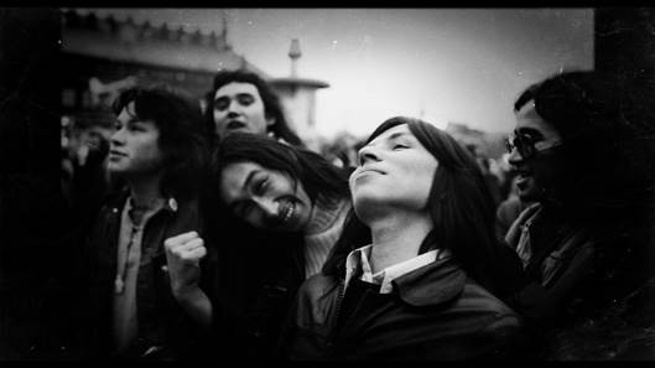
Dir.: Inuk Sillis Hoegh
Documentary; Denmark/Norway 2014, 73 min.
Over 700 years ago the Inuit settled in Greenland but for the last quarter of a century their culture, that thrives on cooperation rather than the trademark firerce competition of the West, was fading suppressed by their Colonial masters in Denmark. Danish is the first language of the country, taught at school, and no professional career in Greenland is possible without it. And whilst there is an “Advisory Council” on the island, all decisions are made by the Danish parliament – and that still stands today today, even after Denmark granted Greenland a sort of home rule
It took a rock band called SUMÉ finally to ignite their revolutionary spirit back in 1972, performing for the first time in the Greenlandic language and led by singer and songwriter Mlik Hoegh and composer Per Berthelsen. Their first album “Sumé 73” – the cover showing the reproduction of a 19th century woodcut depicting a Danish trader killed by Inuit hunter – was so radical that even their young supporters were in awe of the music. The group met while studying in Copenhagen. The Sumémusicians felt, like many of their fellow citizens “that Denmark was getting rich on their backs.” Greenlandic cultural identity and lifestyle was slowly be replaced by the Danish way of life.
But many older politicians wanted to keep the status quo, and Sumé and its young followers used the Vietnam War and the Black Panther movement to connect to the protest movement in Europe. Their songs were rooted in the struggle in their homeland, like “Quillisat”, the name of a mining town which was abruptly evacuated: the Danish authorities had decided that the profit margin was not sufficient enough so all inhabitants were moved from their old-fashioned family homes into high-rise blocks far away. As predicted by many, the group split up in 1974 after he members returned to Greenland at the end of their studies, even though they were re-united in 1988, producing a forth album.
Sumé is not only a nostalgic trip into the past, the – by now rather aged – fans of the group give their opinion in interviews, and their tenor is clear: not much has changed in Greenland and the hope is for a new generation, bringing real independence to the country. Anyone watching the newsreel clips of Danish royalty in their court outfits visiting the Inuit, will agree to the mismatch: this is not a marriage of consent, but a convenient economical deal for Denmark. The spirited resistance of Suméé’s music lives on and is well integrated in this lively documentary about an ancient culture trying to free itself from it s colonial chains. AS
SCREENING AS PART OF THE 4TH NORDIC FILM FESTIVAL | ON TOUR NATIONWIDE UNTIL JANUARY 2016 | NOTTINGHAM | MANCHESTER |
[youtube id=”7Ia1Sl1S3Qs” width=”600″ height=”350″]